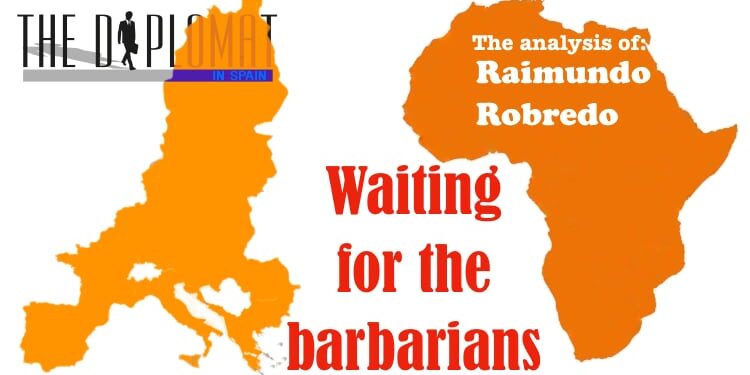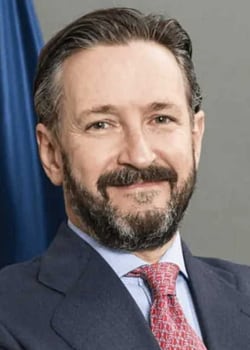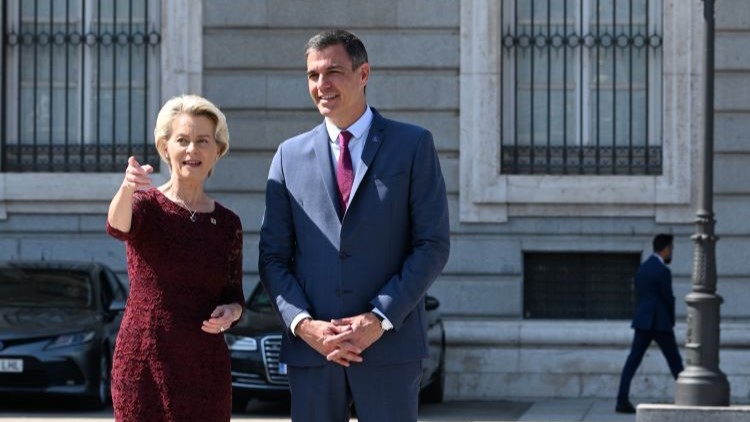SUMMARY
The relationship between Africa and Europe seems to be deteriorating just when it is most needed. Despite European efforts to establish an intercontinental alliance, misgivings remain on the African side. Other powers are taking advantage of this space to strengthen their presence in Africa. The tools that the EU is using to improve its position with regard to the continent are not bearing the desired fruit, possibly because they are based on misconceptions.
Raimundo Robredo Rubio / IEEE
Africa can be a great opportunity for Europe. A young continent, with enormous resources (some of them indispensable for our longed-for energy transition), and with great growth potential. It is the last frontier of globalization, the last corner of the planet not yet fully integrated into global value chains. And we know from experience that when a country joins the great global factory, its prosperity accelerates and its poverty plummets. China and India should suffice as examples, although there are many more. Unlike what happened with the incorporation into globalization of Asia or Latin America, Europe would be at the gates of Africa’s transformation.
To make this possible future a reality, the European Union has used the tools it knows. On the political front, we have promoted democracy and human rights by funding and supporting local civil societies and sanctioning serious violators. On the economic front, we sign Economic Partnership Agreements (EPAs) and provide development assistance. On the security front, we deploy our own training missions or fund African Union (AU) missions. Governing all these actions, we maintain a permanent dialogue between the European Union and the African Union, with summits every three years.
The results are, unfortunately, meager. Far below what could be expected from the political and economic resources invested. When Russia invaded Ukraine we discovered that half of the African countries were not even able to vote with us in the UN General Assembly to condemn the aggression. It is clear that what we are doing is not working as it should and that we should make changes. In the following lines we will see what is going wrong at the political, economic, security and foreign policy levels, and what we could do to remedy it.
The frontiers of politics: the rollback of democracy in Africa
Mo Ibrahim is a Sudanese billionaire and creator of a telecommunications empire. In 2006, he decided to create a foundation that bears his name and is dedicated to promoting democracy in Africa. The Mo Ibrahim Foundation annually awards a prize to African heads of state who leave power peacefully after losing elections, having governed democratically and with respect for the separation of powers. The prize is endowed with five million dollars, plus a life salary of 200,000 dollars a year, all designed as an incentive to promote peaceful alternation. In the seventeen years since the prize was created, it has been awarded only seven times and declared void the other ten. The last laureate, in 2020, was Mahamadou Issofou, President of Niger, who voluntarily left power after two terms in office. His elected successor, Mohamed Bazoum, was deposed in July 2023 by a coup d’état.
In addition to this award, the Mo Ibrahim Foundation publishes an annual African Governance Index. For ten years, the index reflected timid but sustained progress. Since 2016, what it reflects is a slow decline of democratic institutionality in the continent, which is expected to accelerate in the 2023 report, and which has seen several coups d’état.
After the autocratic involutions that followed the “Arab Spring”, instability in the Sahel has led to a series of coups d’état in Mali (2020 and 2021), Guinea (2021), Sudan (2021), Burkina Faso (2022) and Niger (2023). In Chad, the death in strange circumstances of Idriss Deby in 2021 was followed by the immediate proclamation, outside any institutional channel, of his son as president of the Republic. In August 2023, the president of Gabon, Omar Bongo, was deposed by his own presidential guard and replaced by General Oligui. In some of these cases, such as those of Chad or Gabon itself, we are not witnessing a coup against a democracy, but the replacement of one autocracy by another. In Niger or Burkina Faso, however, the deposed governments had been democratically elected (with all the shortcomings one might wish, but reasonably legitimately) a few months earlier.
The African Union adopted in 2007 the African Charter on Democracy, Elections and Governance which prohibits “non-constitutional transfers of power”. Under this charter, voting rights in the AU have been suspended in Burkina Faso, Guinea, Sudan, Mali, Niger and Gabon, but not in Chad or in totalitarian dictatorships such as Eritrea (where power is never transferred, democratically or otherwise). These measures and other related sanctions have had no effect on the illegitimate governments of these countries. In the cases of Mali, Burkina Faso, the Republic of Guinea and Niger, the regional organization to which these countries belong, the Economic Community of West African States (ECOWAS), adopted severe sanctions and even threatened, in the case of Niger, military intervention. None of these measures, whether continental or regional, have succeeded in preventing the consolidation of the coup governments in power in all the cases mentioned above. At the same time, in the last three years, we have seen Ethiopia descend into the horrors of a fratricidal war, Mozambique see the birth of a jihadist insurgency in the north of the country, the Democratic Republic of Congo (DRC) once again face armed conflict in its border regions with Rwanda, and the conflicts in the Central African Republic and Libya fester.
Between 2017 and 2021, I was Director General for Africa at the Ministry of Foreign Affairs. During that period, the 3rd Africa Plan was drafted, which posed a dilemma that is still valid today. Africa’s population growth is going to transform the continent. This is not something we can influence: it is already happening. The continent’s current population of about 1.3 billion people will double in the next 30 years. By 2050, Africa’s population will be around 2.5 billion and one in four people on the planet will be African. By the end of the century, projections by the United Nations Population Fund estimate that the proportion will rise to one in three of the planet’s inhabitants. This population growth is, in itself, a powerful multiplier that will make everything that comes out of Africa gain strength. The good and the bad. The 3rd Africa Plan identifies this phenomenon as “a challenge and an opportunity”, because both negative vectors (jihadism, instability, irregular migration, illegal trafficking) and positive vectors (youth, economic growth, strategic natural resources, innovation) emanate from Africa. Faced with this fork in the road, the Plan was optimistic, and there were reasons for it. In 2019, democratic elections took place in the Democratic Republic of Congo for the first time in its history and, despite all indications that the most voted candidate was not the one finally proclaimed winner, the truth is that there was a peaceful alternation in power, something the DRC had never known before. The conflict in the Sahel was still raging, but all the countries in the region had united to fight it and Western support was strong and militarily significant. Even Boko Haram had split in two, and its historic leader, Abubakar Shekau, had finally been able to reunite with his Creator. One of the continent’s most enduring autocracies, that of Robert Mugabe in Zimbabwe, ended with a coup d’état followed by elections (very imperfect, but preferable to the farces orchestrated by Mugabe). In Kenya, the 2022 elections resulted in a peaceful transfer of power, overcoming fears of violent incidents, such as those that resulted in over fifty deaths following the 2017 elections. Perhaps the most striking example of the advancement of institutionality in Africa was the rerun elections in Malawi in 2020. A year earlier, elections had been held and won by Peter Mutharika. His opponent, Lazarus Chakwera, denounced fraud before the Constitutional Court, which upheld the claim and ordered the elections to be repeated. Almost a year after being proclaimed president, Mutharika agreed to submit to new elections, which he lost. Chakwera became president in a peaceful transfer of power. On the security front, the deployment in the Sahel was winning victories against the Islamic State and the conflict in the Central African Republic seemed to be dying down. Economically, Africa was growing at a good pace and rising commodity prices meant that most African countries had more resources to meet the demands of their growing populations. Faced with the dilemma that the Africa Plan posed, the response was cautiously optimistic, because there were reasons for it.In just five years, we have gone from this cautious but hopeful optimism to the current unstable situation. What happened? The covid-19 pandemic in 2020 hit Africa particularly hard. Not in terms of health, as its young population withstood the virus much better than Europe, Asia or America did. The economic impact of the pandemic, however, wreaked havoc on the continent. Just as it was beginning to recover, Russia’s aggression against Ukraine caused an increase in food, fertilizer and oil prices which, once again, hit the poorest African countries particularly hard. The 3rd Africa Plan identified three anchor countries as strategic: South Africa, Nigeria and Ethiopia. These countries were poles of growth and stability for their respective regions. Five years later, Ethiopia has become a hotbed of instability, Nigeria has been unable to prevent a coup d’état in its northern neighbor and South Africa is increasingly turning in on itself. The European Union has virtually pulled out of the Sahel and Mali is relying on Wagner mercenaries to deal with an increasingly aggressive and successful jihadism. The EU-AU Ministerial Summit, scheduled for November 2023, has been postponed. Apparently, there was not enough appetite on either side. Wars in Ukraine and Israel seem to absorb all the West’s bandwidth, and even China is losing financial steam in Africa. Just as the continent begins to find its voice on the global stage (I will come back to this later), other issues seem to be grabbing the planet’s attention. In Addis Ababa, the seat of the African Union, there is a mantra that is repeated over and over again: African solutions to African problems. Well, recent years have shown the inability of Africans to solve their own problems. Conflicts are festering, democracy is receding and regional and continental institutions are powerless to reverse this trend.
Although the reasons for optimism have faded, the question posed by the 3rd Africa Plan remains: will Africa in ten or twenty years’ time be the young continent of opportunities that is sometimes envisaged or will it be a permanent source of instability from which its own inhabitants are trying to flee? This question matters, mainly because its answer will condition the lives of millions of Africans, but it will also affect our own. What is happening in Africa is no longer – no longer – distant news from an exotic continent. Indifference is no longer an option.
This analysis is part of the one originally published in the Spanish Institute for Strategic Studies. If you wish to read it in its entirety follow this link (in spanish)
Raimundo Robredo Rubio
Spanish diplomat
Since January 2022, he has been the Spanish Ambassador to South Africa. Born in Oviedo in 1971, he holds a degree in Business Sciences and entered the Diplomatic Career in 2001. Between 2017 and 2021 he was director general for Africa in the Ministry of Foreign Affairs, and previously he held different destinations abroad, specifically as first secretary of the Spanish Embassy in Tokyo, and later as counselor in Pretoria and ‘number two’ in the Embassy in Dakar. From 2012 to 2014 he was a vocal advisor for African, Asian and United Nations affairs in the International Department of the Presidency of the Government; and between 2014 and 2017 he served as the second head of the Spanish Embassy in Chile.








